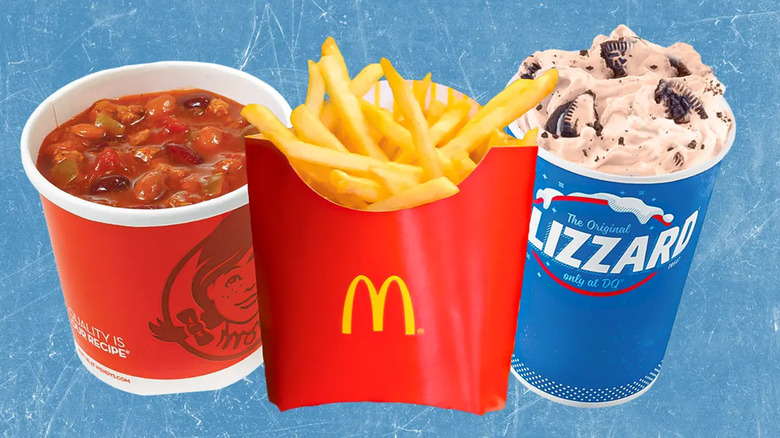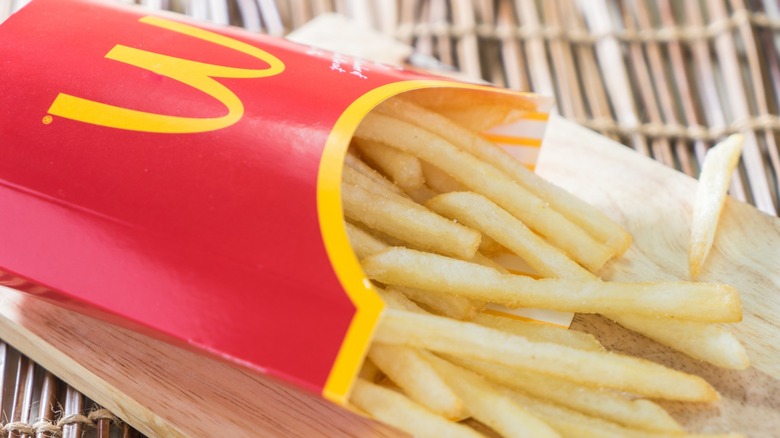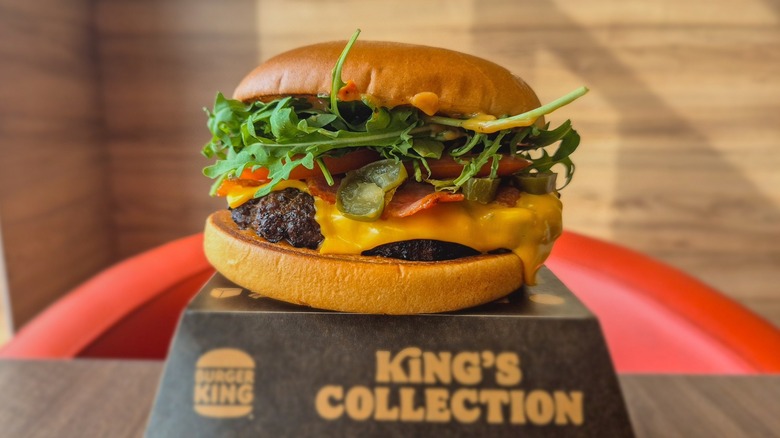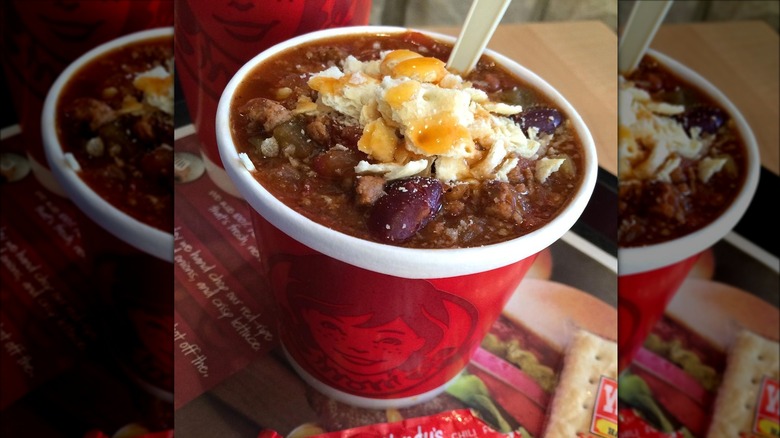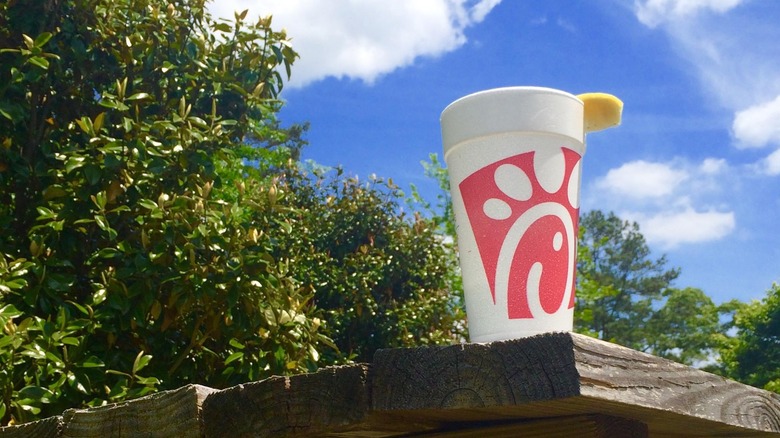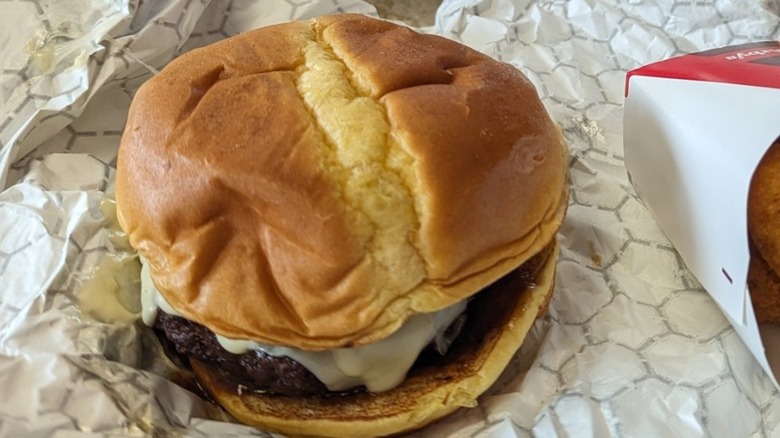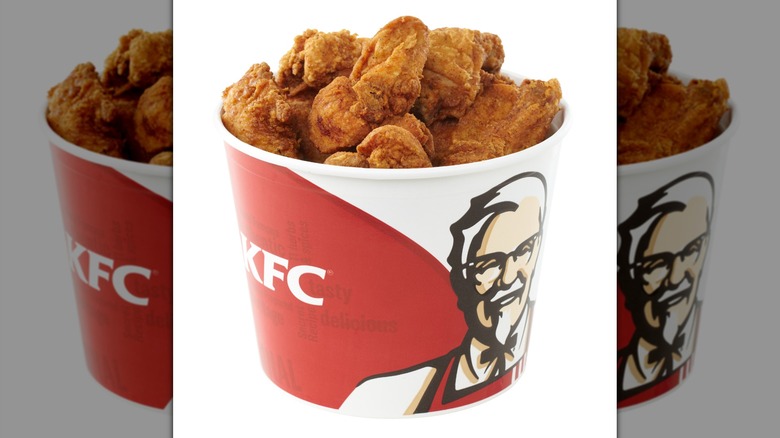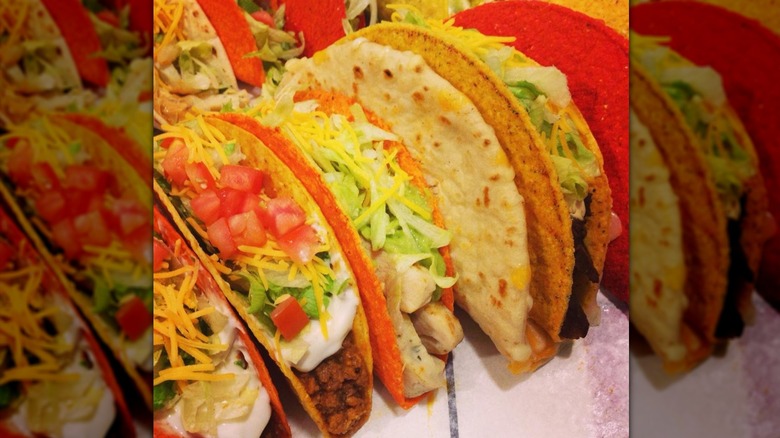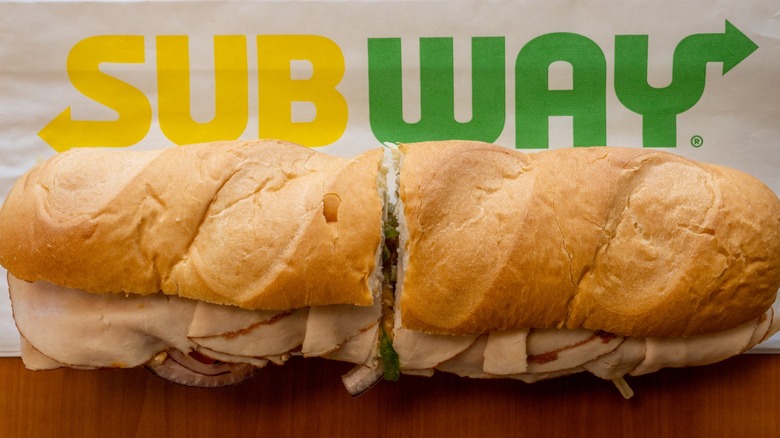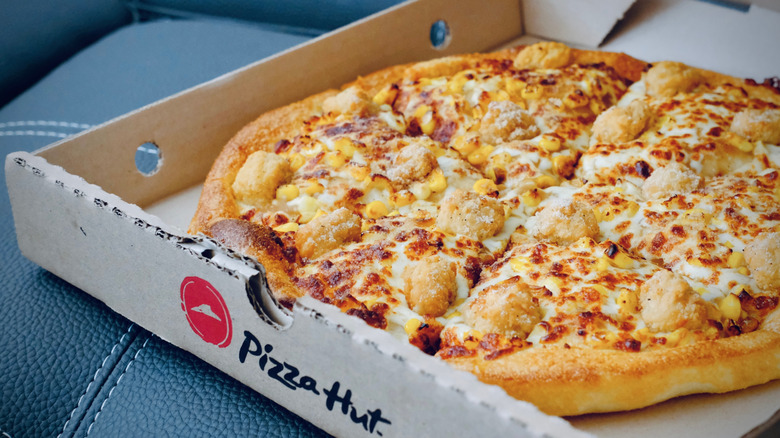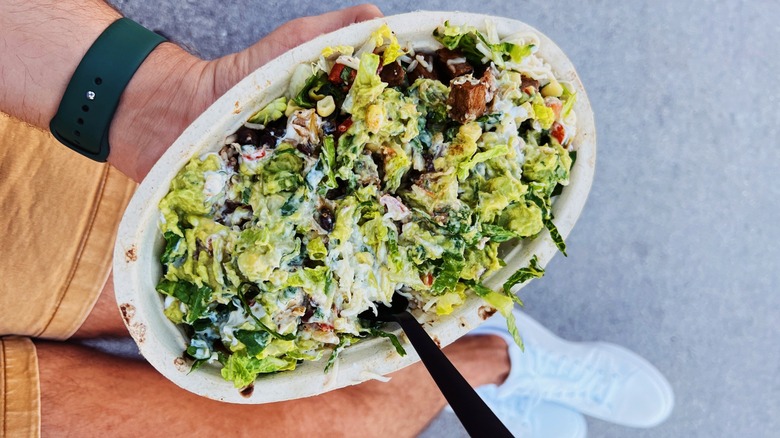Major Fast Food Rumors That Were Surprisingly True
The fast food world has been subject to some gnarly rumors through the years, many of which have been debunked, including the one about its food never spoiling. From wild mystery ingredients to strange happenings on the premises, there's a smorgasbord of fables flying about that can put diners ill at ease when heading out for a bite. In fact, there's probably a rumor or three floating around about almost every fast food outlet on the scene.
But just because you heard the story from a third-hand source doesn't mean the rumor is false. In fact, some myths regarding fast food have turned out to be jaw-droppingly accurate. With whispers circulating about everything from horse meat hamburgers to bread that doesn't live up to its legal definition, it's time to clear the air about a slew of fabled fast food happenings through the years that serve to prove that some rumors may sound like tall tales, but they also happen to be entirely true.
McDonald's french fries aren't vegan-friendly
The outcry from McDonald's patrons when word got around that the chain was using beef tallow in its fries came loudest from the vegan crowd. Fries were presumed to be one of the safest animal-free go-to gets on the menu, yet the fantastic flavor arose in part from the inclusion of animal fats. McD's vowed to clean up its act and use only vegetable-based oils in its fryers, but that didn't solve the issue entirely; it turns out there's still beef-based flavoring being used in these classic crisps.
It isn't as if the chain is hiding this fact from the public either. A glance at the ingredient list on the McDonald's website calls out "natural beef flavor" as part of the formula. It's a squirrely hunt trying to nail down what exactly comprises this flavoring, though the recipe denotes that wheat and milk derivatives are involved. So even if actual beef isn't a factor, there are dairy elements that plant-eaters wouldn't know to avoid if they presumed that the tallow debacle removed all animal products from the fryer. Maybe some day McDonald's will move to fully plant-based fries. That would be a rumor that makes sense.
Burger King burgers contained horse meat
Virtually everyone by now has heard the ongoing rumors of alternate animals being used to create burger patties in fast food restaurants. Usually it comes with some sort of warning that these companies will do anything to save a buck (no pun intended). Maybe it was a self-fulfilling prophecy or maybe the rumor originated because there was truth to the story. Whatever mechanism made it happen, Burger King actually was found to be using horse meat in its burgers, a stomach-turning revelation in which the whopper about a Whopper turned out to be true.
Burger King locations in the U.K. spent weeks in 2013 denying the presence of horse meat in their patties. But samples of beef from a processor called Silvercrest, one of Ireland's Burger King beef suppliers, revealed that there was indeed horse mixed with the cow meat. For possibly up to a year, Silvercrest had imported horse meat from Poland to include in its patties. Once the discovery was made, a major recall was undertaken, both at Burger King and grocery stores where the distributor's packages were also sold. The denials, of course, led to accusations of a cover-up by Burger King, which began bringing in meat from Italy and Germany to backfill for the recall. The crown may be tilted, but the King still reigns.
Wendy's uses unsold hamburgers in its chili
If you have a friend who worked for Wendy's, you may have heard the urban legend that the beef used in the company's famous chili is actually yesterday's burgers crumbled up and given new life. The idea of using food that wasn't good enough to sell on Day One as an ingredient on Day Two when you thought the kettle held chili as fresh as homemade can be a bit of a buzzkill for a Wendy's fan, not to mention calling into question the possibility of sanitation and health rules being violated. But this is one rumor that's not a rumor. Instead, it's a business practice for a company with an eye on food conservation.
Before you get grossed out and decide that you'll never eat Wendy's chili again, consider this: The company is making sure that its still-edible food doesn't go to waste by incorporating it into another dish while it's fresh enough to be consumed. It's an innovative move that reduces food waste and keeps costs down for the company, which hopefully it can pass on to its consumers. Using burger meat also makes the chili taste better. Wendy's is so above board about the practice that it's even called out on the company's website, with an in-depth description of how the process works.
Chick-Fil-A changed its lemonade recipe
Part of Chick-fil-A's success came from the inclusion of a superior lemonade as a signature drink selection. It was a perky pick-me-up that tasted better than homemade and certainly topped the usual Minute Maid options offered in the soda tap at other places. For some, it was as big a draw as the Southern-style chicken and oversized waffle fries the chain is famous for. But taste buds don't lie. Several years ago, customers began detecting something was not quite the same in the cup as what they were used to. It wasn't long before the Internet got hold of the rumor that Chick-fil-A had changed its lemonade recipe.
A little online digging revealed that this rumor is actually reality. As inadvisable as it seems for Chick-fil-A to alter a working formula for one of its core products, the company took the fresh-squeezed component out of its lemonade process. It began bringing in pre-squeezed lemon juice made outside of the restaurant instead. According to the restaurant, the intent was to free up workers to better serve customers rather than spend precious time making lemonade onsite. It's just one of the many changes in the evolution of Chick-fil-A. And though patrons were initially sour on the idea, feedback received by Chick-fil-A shows the public is sweetening up to the new taste.
Whataburger has an all-digital restaurant
If any sector of the consumer landscape is primed for a total tech takeover, fast food is a supreme candidate. Automation for every task in the food prep production chain can be easily achieved in a 21st century world, a phenomenon that got a test run during the COVID pandemic. Going touch-free required chains implementing a host of self-service elements like ordering kiosks and pick-up stations. Whataburger is rumored to have taken the concept even further with a totally digital restaurant that operates without face-to-face interaction between customers and workers. Surely a redesign like this is a little too "Blade Runner" for the 2020s, though ... isn't it?
Apparently, not for Whataburger. The old-fashioned burger outlet came up with a forward-thinking format to test in Austin, Texas, that functions like an updated automat, where customers order via app and retrieve their food through lockers or pickup lanes. Though there is a staff of 50 working behind the digital curtain, there are no seats on the premises of the 24-hour operation. If the concept catches on, maybe you'll see an all-digital Whataburger in your area soon. Then you can tell your rumor-spreading friends that this tall tale, at least, is the real deal.
Arby's served venison and elk burgers
You've probably heard the rumor that Arby's sliced beef was made from some sort of reconstituted powder and wasn't real beef at all. The chain was able to overcome that notion and prove that America's roast beef is indeed roast beef. But if word got around to your parts that Arby's sandwiches went even further than roast beef into the realm of game and hunted woodland critters, well ... that little piece of fast food lore turns out to be absolutely true.
As a limited-time promotion in 2023, Arby's offered Big Game Burgers made of venison, elk, and beef for customers to sink their teeth into. These momentary menu items were tied into a promotion that would send lucky winners on a hike through the Rocky Mountains to see the "most remote Arby's in the world," according to the restaurant chain. The prospect of mixing in a more gourmet protein certainly sounds novel, even if it does sound like something you might write off as just a folk story if you heard your lunchmates chatting about it at the office.
KFC chickens are kept in poor conditions
For decades, nasty rumors have plagued KFC about the food the chain serves, especially the rumor that the company changed its name from Kentucky Fried Chicken to KFC because it wasn't exactly serving real chicken. Though that creepy consideration was debunked, the possibility that KFC supports inhumane practices by relying on factory farm food sources continues to haunt diners who may not want such intimate knowledge of where their food comes from. Sadly, the rumor that chicken farms that produce KFC products uphold a poor standard for animal treatment and have for quite some time is true.
Despite its proclamation of proper practices, factory farms that produce poultry for KFC kitchens are notorious offenders when it comes to making sure the animals they raise are treated humanely. Video and photo evidence regularly shows the company's chosen providers around the world maintain cruel and unhealthy conditions for the chickens they raise. It seems unlikely that pushing through such a high volume of chickens could ever be anything less than humane, but other farms have found ways to maximize the comfort and health of the animals before butchering. Maybe someday, the rumor that KFC has followed suit will be proven true instead.
Taco Bell meat doesn't consist entirely of beef
This is a rumor that crops up more times than the Beefy Crunch Burrito disappears from the Taco Bell menu: The meat used to make the fast food giant's tacos and burritos is only sort of meat. Anyone who's taking a bite of a Taco Bell meat-based item knows that the texture is a little wonky, a bit pastier and mushier than the ground beef they're used to at home. And since tacos are such a familiar homemade dish, it's easy to lay the home experience and the Taco Bell experience side by side to determine that there's something squishy going on. Is it possible that Taco Bell uses something other than beef as the filler for its best known offerings?
It Is, and it isn't. The fact of the matter is that the meat component of Taco Bell's creations is mostly beef, a revelation made during a lawsuit filed against the chain. The more accurate fact is that Taco Bell's mystery meat also contains soy-based fillers and seasonings that can be easily detected by discerning diners. Everything in the mix is fully food safe, so it isn't as if the company is compromising the health of its customers. If you're new to the Bell, you may be caught off-guard by the mouthfeel of the meat. But anyone fully acquainted with Taco Bell food knows that strangely textured soy-beef blended meat is just part of the package.
Dairy Queen doesn't sell actual ice cream
Just because it comes in a cone doesn't mean it's ice cream you're eating. And if it comes from a mechanical pump, you can be sure it's not ice cream, but ice cream's smoother sibling, soft serve. Dairy Queen knows the difference and even announces it in the FAQ section of the company website. But in the rush of the fast food treat world, there can be lingering confusion over whether DQ sells ice cream, especially when customers who haven't really thought about the distinction refer to all the frozen treats the outlet offers as "ice cream." So when the rumor that the frosty palace doesn't serve ice cream recirculates every so often, it's not a rumor. It's a fact.
The distinction isn't necessarily in the ingredients, but in the fat content. The U.S. Department of Agriculture requires 10% butterfat content for a product to be labeled as ice cream; Dairy Queen's soft serve has only 5% butterfat. So while the good news is that DQ's smooth swirls have half the fat percentage that ice cream does, it also confirms the rumor that if you're eating at DQ, you're not eating ice cream. But you can keep calling it that if it makes you happy. No one will judge.
Subway rolls aren't considered bread in Ireland
Maybe you've eaten at a Subway in Ireland and found a slightly different menu than what's available in the U.S. It isn't unusual for chains to customize offerings to suit the tastes of local diners. But rumor has it the bread that held your sandwich isn't considered bread by Irish standards. It's one thing for the fast-food-eating public to question what might be in the meat or cheese; those elements are subject to so much processing that it's sometimes hard to know what you're getting. But isn't bread just bread? Can't you tell by looking at it and smelling it and tasting it that what you have in Ireland around your cold cut combo is just like any other bread you've ever had? The unexpected yet accurate answer is no.
How can Ireland declare that Subway rolls don't qualify as bread? It all comes down to the sugar content, which was deemed too high for the country's legal requirements for the food to be called bread. Instead, the chain's rolls are classified as confectioneries. The designation was the result of Subway trying to avoid a value-added tax (VAT) on its rolls — bread in that country is classified as a VAT-free staple item. Sadly, it was Subway's legal challenge on the topic that revealed the sweet-yet-salty truth behind the rumor that while its rolls may hold a sandwich, that doesn't make them bread, at least not where Subway in Ireland is concerned.
Pizza Hut served a snake-topped pie in Hong Kong
If you think pineapple is a questionable topping for Pizza Hut to put on a pie, wait until you hear about the one topped with snake. That's right. We said snake, or snake meat, to be more accurate. It's another one of those too-wild-to-be-true stories, a rumor you suspect gets larger the more it travels. Depending on how trustworthy the source is, the idea of snake pizza can really put you on the defensive when heading to the Hut for a slice or two.
But the sauce behind the snakes-on-a-pizza rumor is that it's 100% true! The dining scene in Hong Kong is no stranger to serving snake meat in stew form, and to keep up with local tastes, Pizza Hut offered shredded snake meat as a pizza topping as part of its 2023 menu. Though some believe this protein-packed ingredient has helpful medicinal properties, Pizza Hut touted it as an enrichment to its diced chicken topping and served it with abalone sauce rather than the usual tomato-based sauce. It sounds like an attempt to take an Italian classic in a direction that would appeal to regional pizza fans, though there's no word on whether snake pizza will make a return anytime soon. You can't help but wonder if it's an item Pizza Hut staff would avoid or embrace once they gave it a taste test.
Some Chipotle locations were skimping customers
Regular visitors to Chipotle noticed something sinister happening as they watched their assembly-line orders being prepared: Workers were doling out ever-shrinking portions of fillings and toppings. How is it possible that a company forcing customers to watch their food coming together could pull a fast one on a savvy crowd that knows how much sofrito they should be getting in their mega-burrito? Were these hawkeyed customers imagining things, or were sneaky dealings afoot behind the Chipotle counter, dealings that employees hoped customers wouldn't catch onto?
In the instance of this fast food rumor, the adage "the customer is always right" actually does apply. None other than Chipotle CEO Brian Niccol admitted that the TikTokers and Twitterers who pointed out that prices had risen while portions had shrunk weren't seeing things. Approximately 10% of the company's nearly 3,500 locations had engaged in shrinkflation shenanigans, and CFO John Hartung had promised that despite the additional expense, Chipotle had begun making amends and ramping up its portion sizes again. So while no one likes to be duped by a rumor, sometimes it pays to listen in, follow up, and find out the truth. There could be an extra scoop of beans in it for you.
